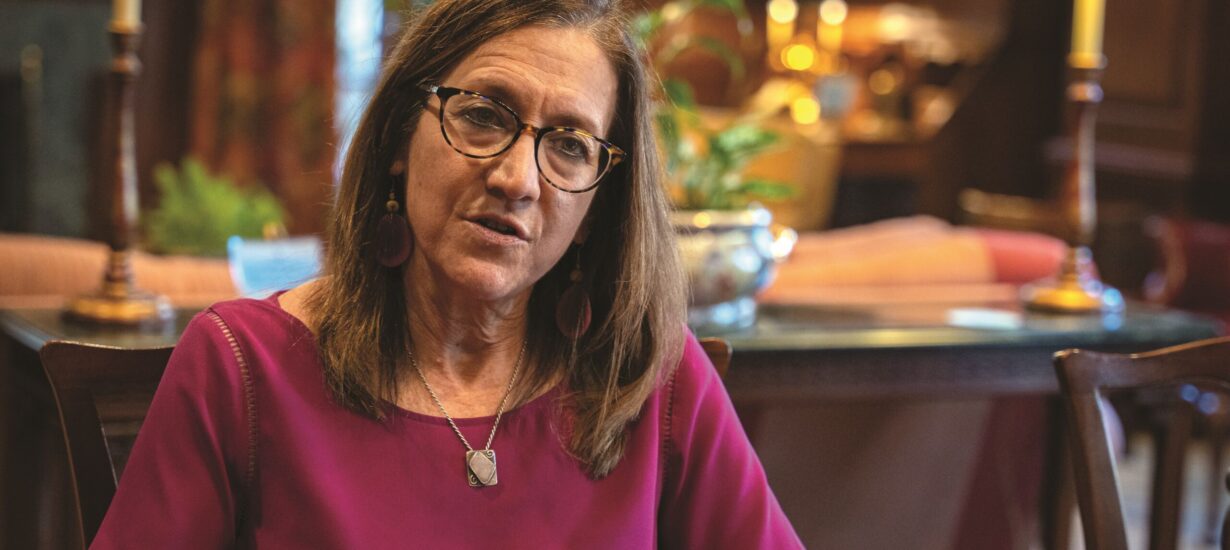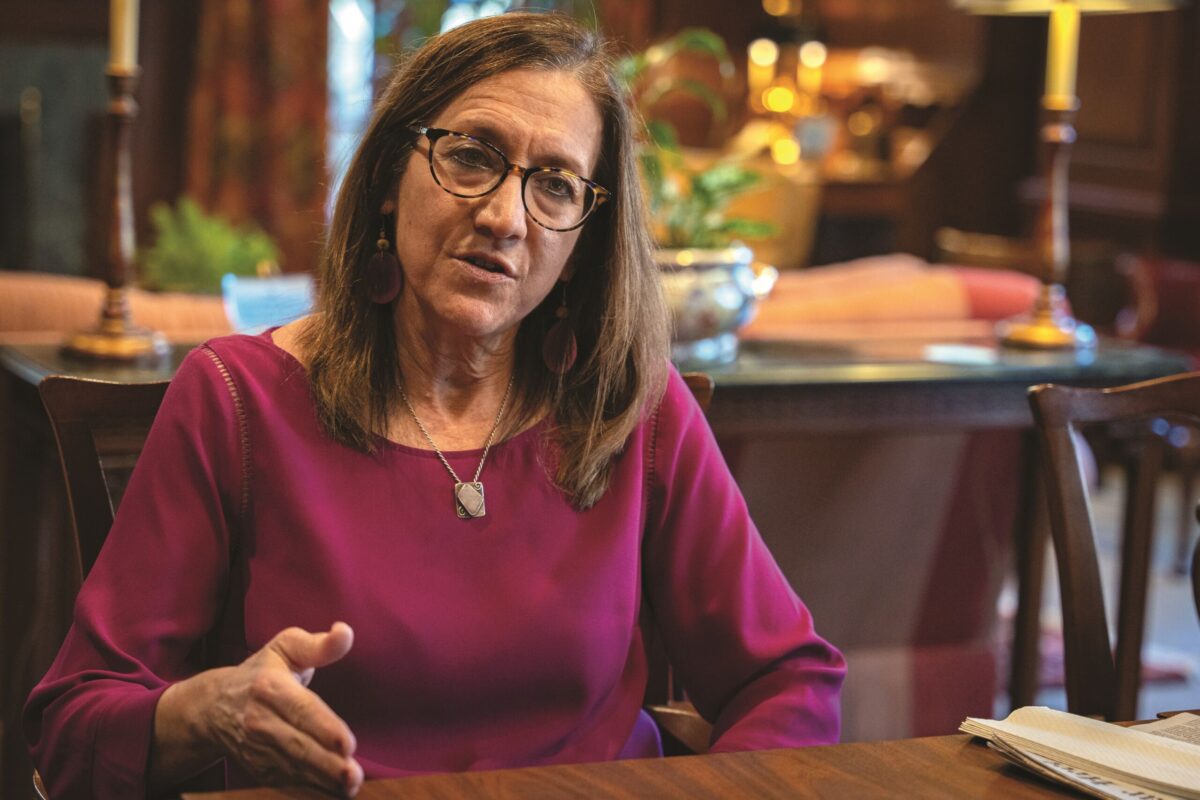Faculty Council Chair Reflects on Tumultuous First Year


“There have been so many events that were unanticipated or completely unexpected. … I’d planned to set some strategic goals, but it’s been one event after the other that needs to be addressed,” Beth Moracco ’92 (MPH, ’99 PhD) told the Review. (Photo: Carolina Alumni/Cory Dinkel)
It’s been almost a year since Beth Moracco ’92 (MPH, ’99 PhD), an associate professor in the Gillings School of Global Public Health’s department of health behavior, started her three-year term as chair of the Faculty Council. In that time, she has had to lead the faculty through the fallout of numerous campus-altering events, including a Supreme Court ruling striking down affirmative action in admissions, a campus shooting, protests over the war in Gaza and the departure of a chancellor.
Those events, she said, have distracted her from the goals she set out when she entered the office July 1, such as continuing to build an inclusive and equitable environment for faculty, students and staff; safeguarding the role of faculty in decision-making; and advocating for full, timely and transparent information sharing for all matters concerning faculty. On top of that, Moracco is a member of the Chancellor’s Search Advisory Committee.
Moracco, who joined UNC’s faculty in 2008, is also associate director of the UNC Injury Prevention Research Center. Her research focuses on the primary and secondary prevention of gender-based violence in the U.S. and global settings.
The Faculty Council meets monthly during the academic year to discuss and debate campus and UNC System issues, sometimes passing nonbinding resolutions to inform the University, the Board of Trustees and the Board of Governors.
The Review sat down with Moracco to discuss her first year at the helm. This article has been edited for brevity and clarity.
What are your top goals as chair of the faculty?
Moracco: The goals and the order of the goals keep shifting because we’ve had so many things happening. A goal that I’m focusing on right now is transparent communication between faculty and the administration, particularly since we have an interim chancellor in place. I think that will go a long way toward reestablishing trust between faculty and administration.
So far things have been excellent. Even before he [Interim Chancellor Lee Roberts] started, he reached out to me. We now have regular one-on-one meetings every three weeks. I do the same with Provost Chris Clemens in separate meetings. I invited Chancellor Roberts to come to the Faculty Council meetings and was really pleased that he took us up on the offer.
What have faculty asked you to set as your priorities?
I’ve talked to a lot of individual faculty and faculty groups since I became chair. Faculty are not monolithic. Teaching, developing curriculum, mentoring, doing our research, shared governance and allowing faculty to have a voice are really on the forefront of a lot of faculty members’ minds right now. It all goes back to communication. The more there is communication among all of the stakeholders, the better. And I would say that’s probably the [biggest] concern I’ve heard from faculty, though people have different points of view about how we should go about it. Salary was a concern that came up in the Chancellor’s Search Advisory Committee. We aren’t competitive with our salary packages. Being able to be more nimble and offer more compensation is important. We want to be able to attract and keep excellent faculty.
“One of the things about being in this position that has been really lovely … is just realizing how dedicated faculty are to their craft, to their students, to their work and how much they deeply, deeply care about this institution.” — Beth Moracco ’92 (MPH, ’99 PhD)
What have you found most challenging in your first year?
I think that there have been so many events that were unanticipated or completely unexpected. We’ve had to be reactive rather than proactive. I’d planned to set some strategic goals, but it’s been one event after the other that needs to be addressed, such as the United States Supreme Court decision that ruled affirmative action unconstitutional, the shooting of Professor Yan, the Hamas attack on Israel and former Chancellor Kevin Guskiewicz’s decision to leave UNC to accept the presidency at Michigan State University. That takes time way from being more intentional and thoughtful.
What would you like to see in UNC’s next chancellor?
Faculty very much desire that this is a true, open and national, if not international, search … that prioritizes the qualities that we need in the chancellor. For many faculty that does include experience in public higher education, someone who sees public higher education as a public good. Faculty want to have an authentic voice and a role in that process. We do hope there will be multiple opportunities for faculty to be exposed to the finalists … and have their input heard and considered. It’s not just faculty. I’ve also heard that staff and student interests also should be represented.
Other campuses in the UNC System have had to cut back on offerings in the humanities. What do you think is the future of the humanities at Carolina?
I think there’s strong support for the humanities on this campus from faculty, of course, but also from the administration, including the interim chancellor. He voiced his support for the humanities and has family members who are in the humanities. I think there was a lot of concern when they [the N.C. General Assembly] made the decision regarding matched professorships being for STEM only. It felt disrespectful to some faculty or as a lack of appreciation for the humanities. I think there’s a lot of support for the humanities and social sciences. I think we need to tell the story better and make the case better for the humanities.
Some faculty were upset they weren’t consulted when UNC’s new School of Civic Life and Leadership was announced last year. Now that the school has named its first faculty members and a dean, how do faculty generally feel?
I think there’s still some skepticism among faculty. I think that many faculty were relieved when they saw the list of inaugural faculty. There’s going to be an effort to rebuild trust because of the way it was brought to faculty. I think that most faculty are not opposed to students being exposed to these topics, but something that has the perception of being imposed is always going to be met with resistance. Dean James White [of the College of Arts and Sciences] has been good about putting communication out there about what’s happening and updating people.
It would be naïve to say there still isn’t some skepticism … mostly because of the process. One of the things about being in this position that has been really lovely … is just realizing how dedicated faculty are to their craft, to their students, to their work and how much they deeply, deeply care about this institution. We are unfairly portrayed as being complainers and whiners, when faculty work so hard.
What else would you like alumni to know?
As we continue to have conversations and discussions, particularly on contentious issues, how can we ensure we foster a space that is safe and civil and respectful? I think we’re doing a lot of the things that we should be doing. There have been multiple events on campus with speakers with different expertise on different topics, including the Middle East and the press. These opportunities can bring people together and allow people to hear information, discuss the information and dialogue, which I think is a very important way to have these conversations. This is our role, that we bring ideas to the table and discuss them and debate them and bring evidence to support them. I think that many faculty are taking the initiative to sort of hone our skills to facilitate these difficult issues.
Inclusivity and dismantling obstacles to our students are important. Because of the Supreme Court decision, we had to change some of our practices, but I think that goal and commitment to be a place that’s diverse and inclusive remains.
— Laurie D. Willis ’86
Thanks for reading the Carolina Alumni Review
Carolina Alumni members, sign in to continue reading.
Not yet a member? Become one today.
